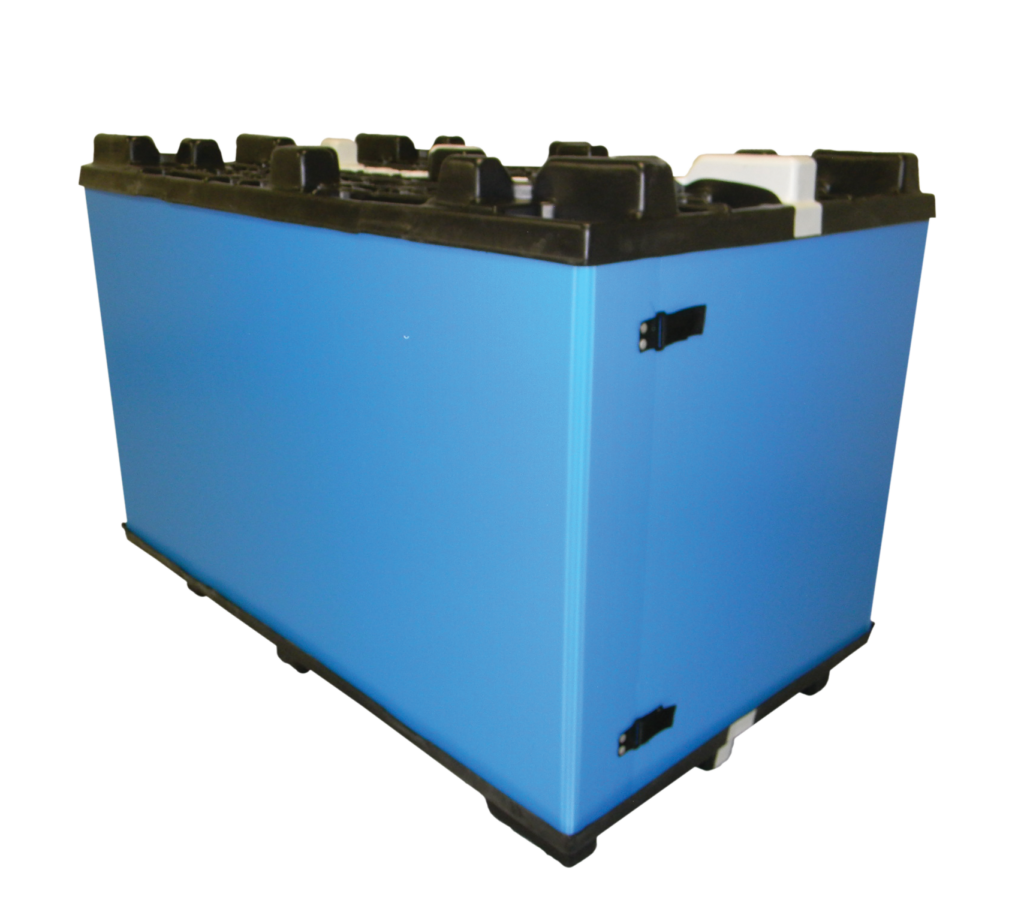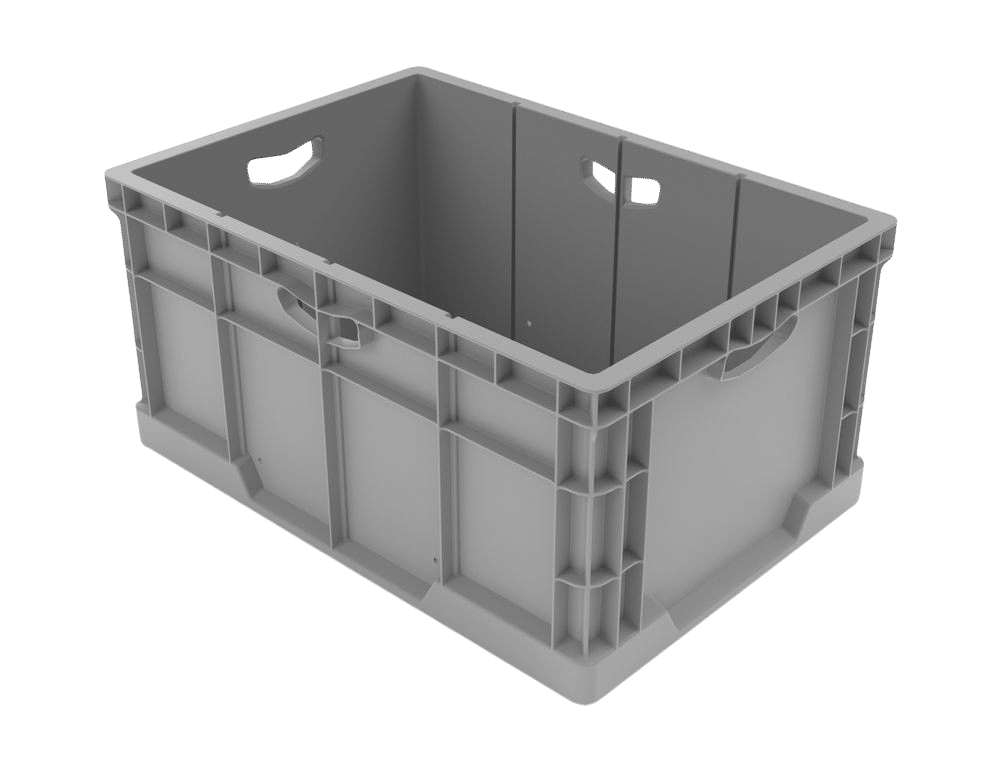In an industry where precision and durability are non-negotiable, corrugated packaging in the automotive market is a silent yet pivotal player that ensures the safe transit of parts from manufacturers to assembly lines around the world.
As the automotive sector evolves with technological advancements and a heightened focus on sustainability, the demand for reliable and eco-friendly packaging solutions has never been greater.
In this blog post, we will navigate the current landscape of returnable packaging in the automotive industry, examining why these materials are the linchpin of automotive parts packaging, and how companies like Universal Package are driving innovation to meet the industry’s changing needs.
The Importance of Packaging in the Automotive Industry

Packaging plays an indispensable role in the automotive industry, ensuring the safety and integrity of parts from the manufacturer to the end user. It is the first line of defense against potential damages during transportation and handling. Efficient packaging solutions are also pivotal in optimizing the supply chain, as they can significantly influence both the cost and speed of delivery.
The automotive sector is increasingly focused on sustainability, prompting a demand for packaging that aligns with environmental goals. This shift towards eco-friendly solutions is reshaping industry standards and influencing the development of new packaging materials and methods. Companies are now challenged to balance protection, efficiency, and sustainability in their packaging strategies to stay competitive and meet regulatory demands.
As such, returnable or reusable packaging has emerged as a leading solution for automotive parts packaging, offering a balance of protection, efficiency, and sustainability.
Current Trends in Plastic Corrugated Packaging in the Automotive Industry
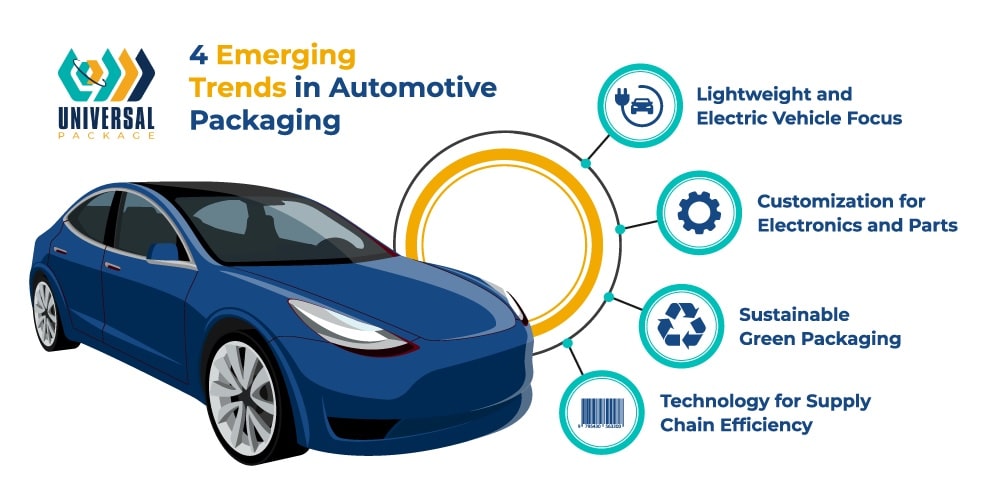
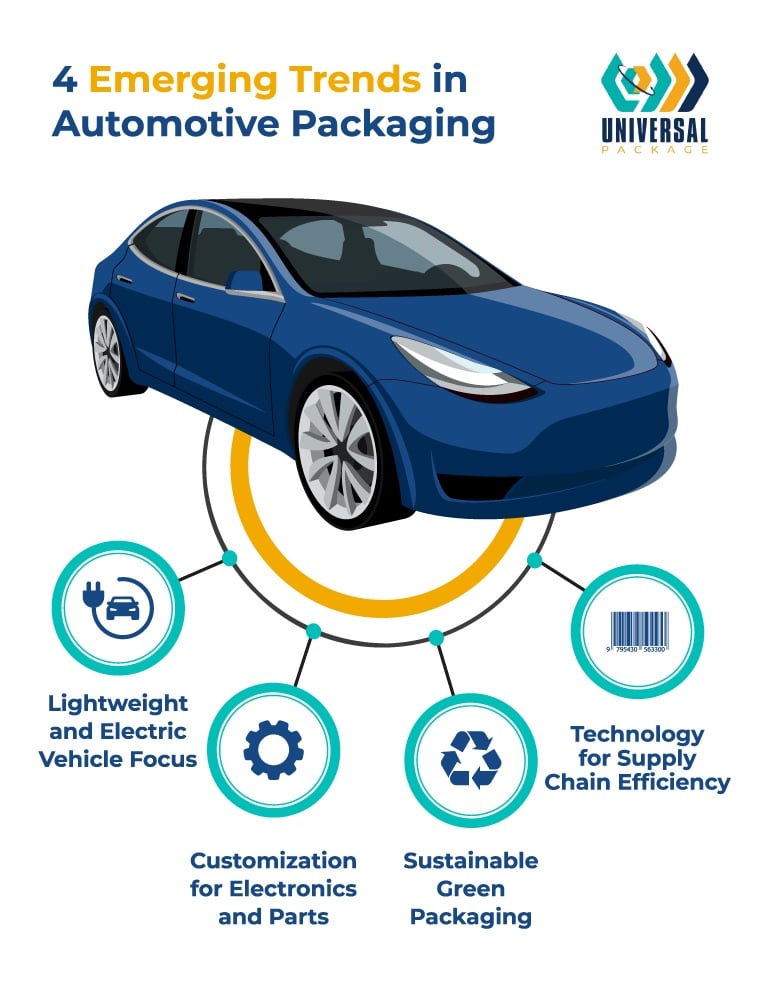
The returnable packaging for the automotive industry is experiencing a palpable shift as manufacturers increasingly opt for packaging solutions that accommodate the evolving landscape of vehicle components, particularly lightweight and electric vehicle parts.
Lightweight and Electric Vehicles
The massive debut of lightweight cars, such as electric vehicles and hybrids, needs to be considered. Automotive packaging has been effectively disrupted. We observe expansive development in vehicle electrification, ridesharing initiatives, advanced driver-assistance systems (ADAS), autonomous driving technology—all compelling manufacturers to reconfigure automotive packaging strategy.
Customization for Electronics and Parts
One of the key trends encountered within this industry relates directly back to fundamental design elements that go into creating today’s automobiles – electronics innovations and a heightened focus on parts standardization. Plastic corrugated materials are proving to be highly adaptable, meeting these new demands with customized structural designs that maintain integrity and protection during transit.
Sustainable Green Packaging
Sustainability is another powerful trend shaping the industry, with automotive companies seeking out green packaging options to reduce their environmental footprint. Returnable packaging responds effectively to this call, as it is typically made from recycled materials and is itself recyclable, offering a closed-loop solution that appeals to eco-conscious businesses.
Technology for Supply Chain Efficiency
Moreover, the integration of technology is becoming ever more prevalent, with smart packaging solutions offering improved tracking, inventory management, and enhanced supply chain efficiency. These technological advancements are not only optimizing logistics but are also providing greater transparency and control over the distribution process.
While these trends shape the industry, packaging companies are responding by leveraging their expertise and technology to develop advanced solutions that cater to the unique needs of automotive parts packaging.
3 Challenges The Automotive Industry is Facing Today
The returnable packaging for the automotive industry is not without its share of challenges.
- Intricate Parts – As the automotive industry continues to innovate with the introduction of new and complex parts, especially in the realm of electric vehicles, packaging solutions must evolve concurrently. The intricate shapes and sensitive technology of these parts demand precision in packaging design to ensure maximum protection during transit. As the industry shifts towards lightweight and electric vehicle components, the demand for packaging that is strong yet lightweight presents a significant challenge for material suppliers and packaging companies.
- Cost – Companies are under constant pressure to deliver high-quality packaging that meets stringent industry standards while also keeping expenses low. This balance becomes even more delicate when considering the sustainability aspect, as eco-friendly materials and practices can sometimes come with a higher price tag.
- Supply Chain – Moreover, the industry must maintain supply chain resilience amid global disruptions, such as pandemics or trade conflicts, which can cause volatility in material availability and prices, affecting the production and distribution of packaging materials.
This challenge highlights the need for strong partnerships between automotive companies and packaging providers to ensure a reliable supply chain and timely delivery.
Advantages of Returnable Packaging for Automotive Parts
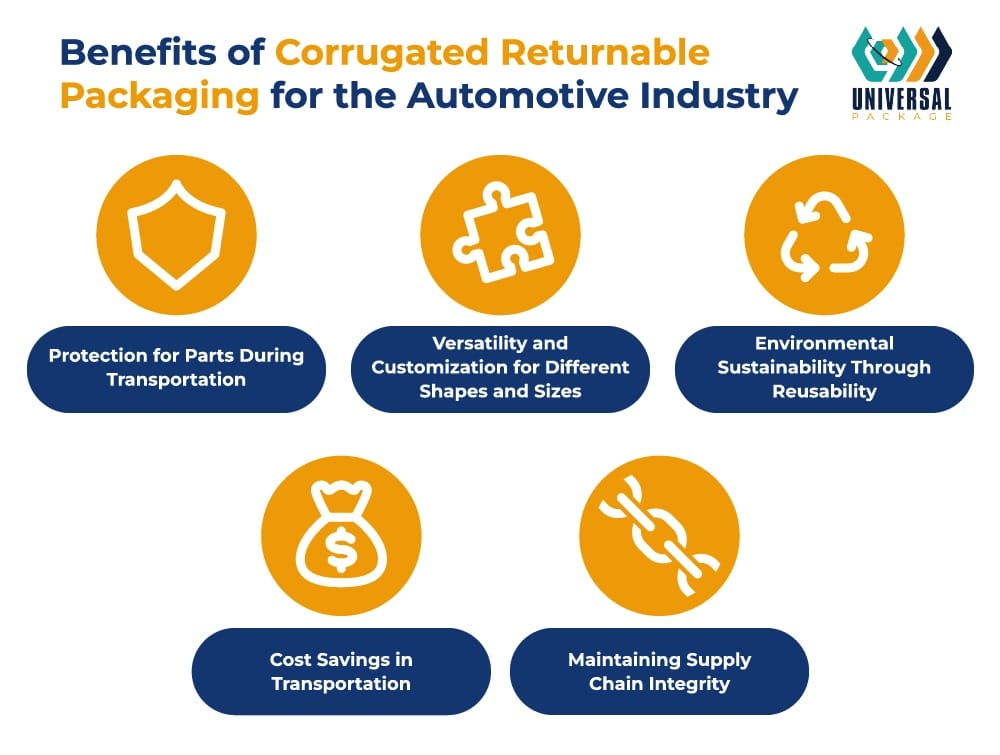
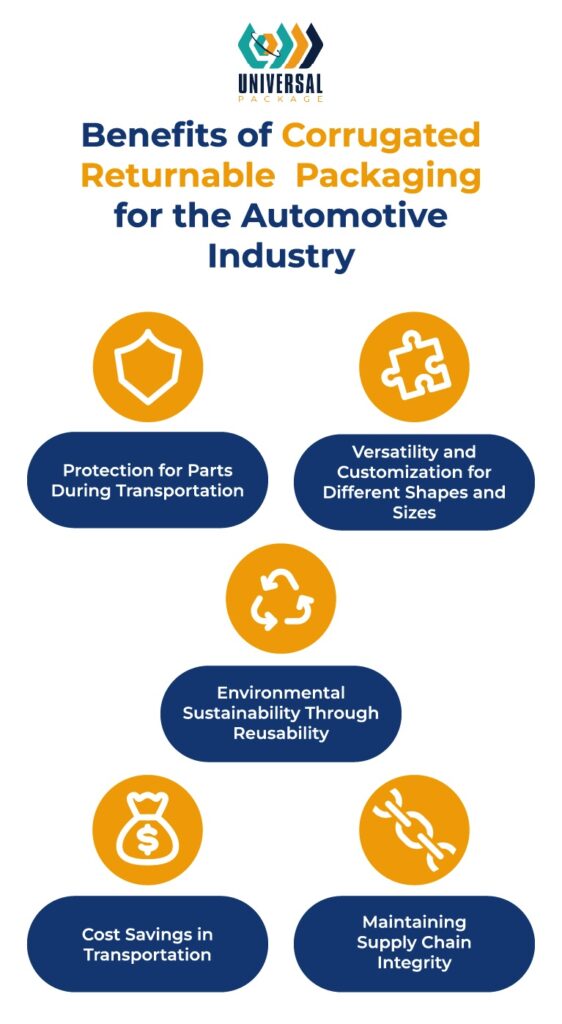
Corrugated Plastic packaging offers unmatched protection for automotive parts, crucial for components that often travel long distances to reach assembly lines or distribution centers.
The strength and durability of plastic materials help prevent damage from impacts, vibrations, and compression that can occur during shipping and handling. This material is engineered to provide a cushion for parts, ensuring they arrive in perfect condition, which is vital for maintaining the integrity of supply chains in the automotive industry.
The versatility of reusable packaging is another significant benefit. It can be customized to accommodate the wide variety of shapes and sizes inherent to automotive components, from small fasteners to large body panels. This flexibility allows for efficient stacking and optimization of space within packaging, reducing the risk of damage during transit.
Additionally, the use of plastic corrugated materials supports environmental sustainability efforts within the industry; these materials are recyclable and often made from recycled content, contributing to a circular economy. Moreover, the lightweight nature of plastic packaging can lead to significant cost savings in transportation, as lighter packages can reduce fuel consumption and lower shipping costs.
These benefits position plastic corrugated packaging as the material of choice for automotive packaging needs.
Opportunities for Growth and Innovation
The plastic corrugated automotive packaging market is ripe with opportunities for growth and innovation, particularly as the industry responds to global market dynamics and evolving consumer expectations.
The incorporation of smart packaging technologies presents a significant opportunity to enhance supply chain visibility and efficiency. These advanced solutions can enable real-time tracking of shipments, condition monitoring of the automotive parts within, and integration with inventory management systems, leading to more informed decision-making and reductions in waste.
Emerging markets are also a promising frontier for expansion in the automotive packaging sector. As economies develop and the demand for automobiles rises, the need for reliable and efficient packaging solutions grows alongside. Targeting these regions offers packaging companies the chance to establish an early market presence and build long-term relationships with growing automotive manufacturers.
There is ample room for collaboration between packaging providers and automotive companies to develop customized packaging designs that meet the specific needs of new vehicle models and components, thereby fostering innovation and potentially setting new industry standards.
This collaboration can also lead to the development of sustainable packaging solutions that meet both regulatory requirements and consumer demands for environmentally responsible products.
Finally, the industry’s focus on sustainability presents an opportunity for packaging companies to leverage eco-friendly materials and practices to differentiate themselves in the market. By incorporating sustainable solutions into their packaging offerings, companies can appeal to the growing number of environmentally conscious consumers, creating a competitive advantage in the market.
How Universal Package is Leading the Way in Returnable Packaging in the Automotive Industry
Universal Package has established itself as a pioneer in the realm of plastic corrugated packaging for the automotive industry, underpinned by a steadfast commitment to innovation and quality.
Recognizing the intricate needs of the automotive sector, the company has honed its expertise in crafting packaging solutions that not only meet but exceed the exacting standards of the industry. Their solutions are characterized by durability, versatility, and sustainability, ensuring that automotive components arrive at their destination in pristine condition.
Case studies of Universal Package’s client engagements illustrate the tangible benefits of their packaging solutions. They have a track record of successfully addressing the unique challenges faced by automotive companies, which has cemented their reputation as a reliable partner in the packaging industry.
The company’s services are distinguished by a comprehensive approach, encompassing design, material selection, and supply chain optimization, all tailored to the specific contours of each client’s needs.
Beyond its core offerings, Universal Package is also at the forefront of incorporating eco-friendly practices, actively contributing to the reduction of the industry’s carbon footprint through its environmentally responsible packaging initiatives.
Partnering with Universal Package for Automotive Packaging Needs
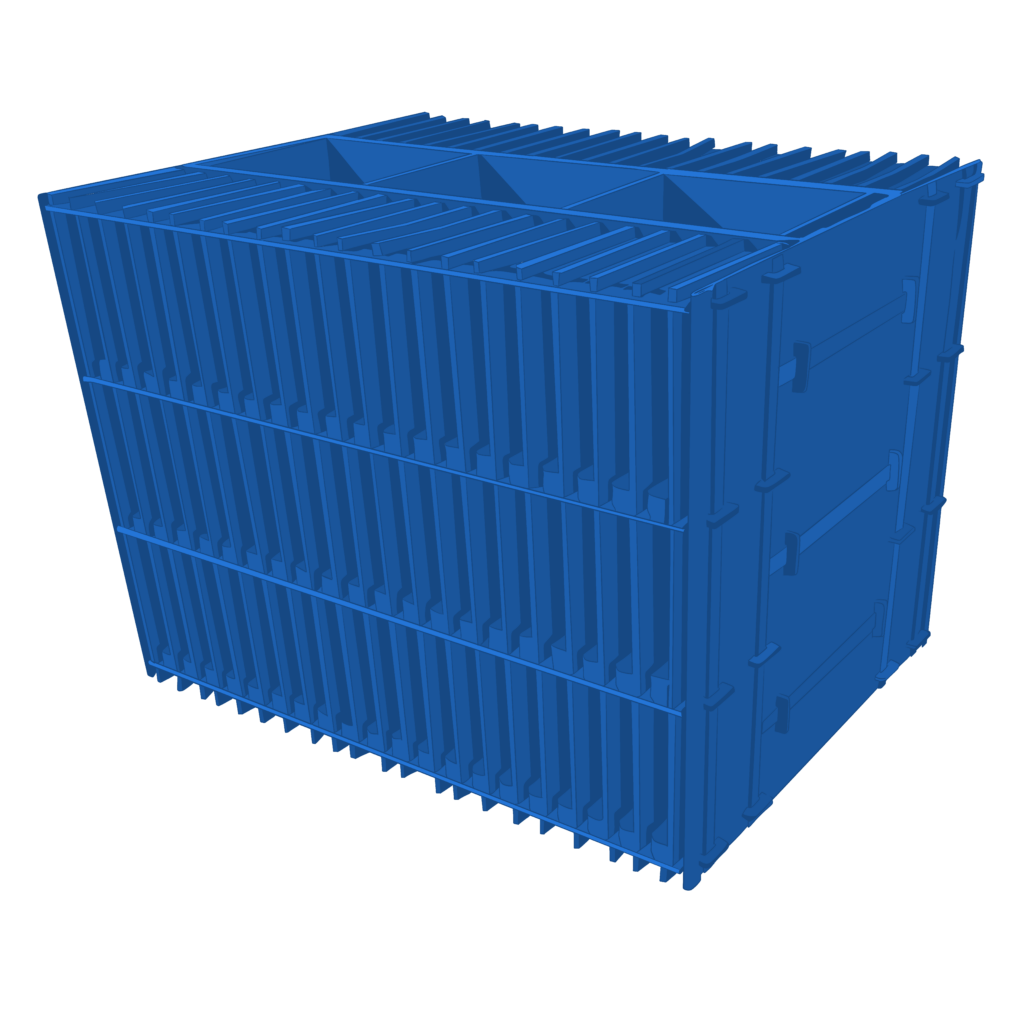
Partnering with Universal Package offers an array of benefits for businesses in the automotive industry looking for expert packaging solutions.
The consultation and design process with Universal Package is thorough and tailored, ensuring that clients receive packaging that is perfectly suited to their specific needs. This collaborative approach involves a careful analysis of the client’s requirements, followed by the development of a customized design that optimizes protection, efficiency, and cost.
Testimonials, such as the one shown above, from satisfied automotive industry clients serve as a testament to Universal Package’s proficiency in delivering high-quality packaging solutions. These endorsements highlight the company’s ability to exceed expectations in terms of product quality, customer service, and innovative design, reinforcing their reputation as a trusted partner in the automotive packaging market.
Partnering with Universal Package: Driving Innovation and Efficiency in Automotive Packaging Solutions
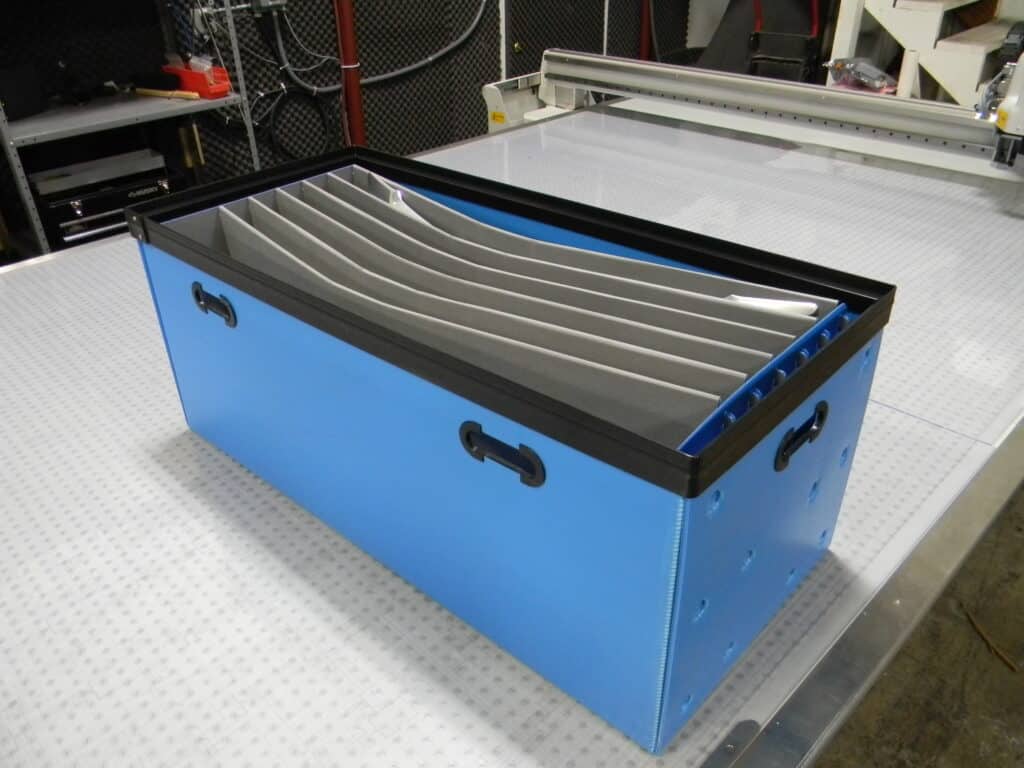
As we have explored, the corrugated plastic automotive packaging market is not just about keeping parts safe; it’s about driving efficiency, embracing sustainability, and staying ahead in a constantly evolving industry. With a clear understanding of the advantages and the latest trends, it’s evident that choosing the right packaging partner is pivotal.
That’s where Universal Package comes into play. Our dedication to delivering custom, innovative packaging solutions ensures that your automotive parts are protected and your supply chain operates smoothly. With our commitment to quality and sustainability, we are not just a supplier; we’re a partner in your success.
Make the smart move for your automotive packaging needs. Reach out to us at Universal Package and let’s craft the perfect solution together. Our team is ready to consult with you, manage your project with the utmost care, and provide the exceptional service you deserve. Let’s start the conversation and drive your business forward.

